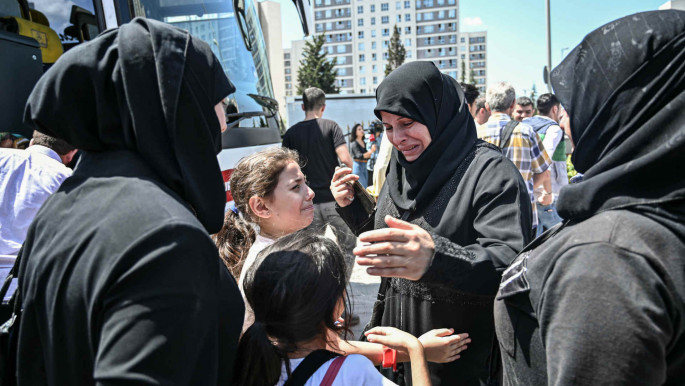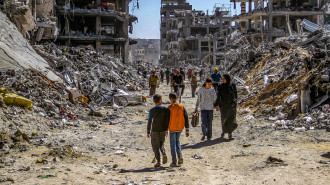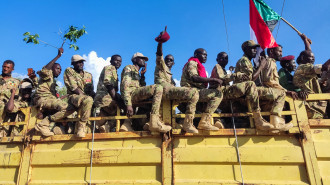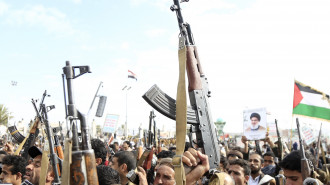Syrian refugees go into hiding as Turkey begins crackdown
It's been some weeks since the end of the Eid al-Adha holiday and the streets of Istanbul's Esenyurt district are vibrant again, but the usual landscape has one striking difference this time – Syrian refugees have somehow disappeared.
On July 22, Istanbul Governor's Office issued a statement, declaring that the refugees who aren't registered in Istanbul had nearly a month to leave the city.
"Foreigners of Syrian nationality who are not registered under the system of temporary protection or who do not have a residency permit will be expelled to their designated provinces by the Ministry of the Interior," it said.
There are currently 547,000 Syrians living in the city, according to the governor's office, which said no new registrations were being accepted for refugees.
Many of the refugees had been registered to live in different Anatolian towns, but they had to move to the country's commercial centre to join the workforce in a shrinking economy. Also, under the system, they must stay in the province to which they are assigned, and can only visit other cities with short-term passes.
In a statement published in Turkish and Arabic, the Istanbul governor's office said it would no longer tolerate Syrians who are assigned to other provinces.
Simultaneously with the governor's statement, police started a crackdown the same day, with detainment of the refugees shown in the evening news.
August 20 marked the final day given to Syrian refugees by the city's governor.
It was a warm Tuesday evening after days of heavy rain and the grass-plots that surround children's playgrounds and where Syrian families usually gather for their evening tea, was empty.
"The fear of being detained prevents me from wandering around the city because I'm the only one who has a job in my family," says Ahmed, 27, who takes care of his family of six.
"If they come and find me at where I work, God forbid, then I don't know what will happen," he adds.
NGOs raised their concerns as some refugees were forced to sign voluntariness papers – documents that state their deportation to Syrian soil is voluntarily. Some critics have also raised concerns that Syrian refugees are being forced to sign consent forms in Turkish they do not understand.
 |
Syrian refugees have found themselves as scapegoats in the eyes of Turks enduring high levels of inflation, unemployment, and stagnant economic growth |  |
"We found that even the ones who had been registered to live in Istanbul got deported," said Eyüp Özer, one of the founders of the We Want to Live Together Initiative.
Speaking during a press meeting held at the Association of Human Rights in Istanbul, Özer spoke of Hisham Mustafa, a Syrian who had been deported but "was killed by the Turkish gendarmerie on August 5 as he was trying to cross the border".
 |
|
| Read also: Why is once refugee-friendly Turkey now turning its back on Syrians? |
"Since Syria is a country at war, it's forbidden for any country to deport people there, unless there is a voluntariness paper," says Mehdi Davud, the chairman of the Syrian Associations Platform.
"In some cases, the officials even sign voluntariness papers in the name of refugees, then they send them to Syria. We can't hear from the ones who didn't have IDs."
Konda, one of the country's prominent polling companies, shared their latest results that state "the public opinion regarding Syrians have substantially changed in a negative way."
In 2016, the ratio of Turks that accepted living with Syrian refugees in the same city was 72 percent, but by 2019, it had decreased to 40 percent. #SyriansOut became part of the discourse during municipal elections this year – with many complaining about the number of Arabic signs appearing on shops in Istanbul and elsewhere.
The current state of the economy has also created a domestic backlash for President Erdogan's AK Party, and Syrian refugees have found themselves as scapegoats in the eyes of Turks enduring high levels of inflation, unemployment, and stagnant economic growth.
According to Süreyya Su, an sociologist and columnist, "The government made a reaction in panic, after the big loss at the local elections."
Su thinks that the government put pressure on Syrians to both prove that it holds the real power and prevent any kind of mass reaction against Syrians by outgassing.
"Thus, they showed off their authority to the opposition which gained lots of confidence at the local elections," says Su.
 |
Since the crackdown, many refugees are now afraid of going to work, while women and children have stopped showing up at rehabilitation centres and schools |  |
Before the crackdown, Turkish Interior Minister, Süleyman Soylu had declared that if Turkey opened the gates for Syrian refugees who want to emigrate to European countries, "no European government would be able to stand for even six months".
During bilateral relation discussions between the US and Turkey, Turkish officials argued that eastern Euphrates would be the ideal place for relocating Syrians that currently live in Turkey.
The move against the refugees began when Turkish and US defence ministers held meetings in Ankara, concluding with a joint action plan regarding the eastern Euphrates.
Syria's eight-year conflict has killed more than 370,000 people since it started in 2011, as well as displacing millions at home and abroad.
Some 3.5 million Syrian refugees live in Turkey alone, the United Nations says – more than any other country – but they are only under "temporary protection" because the government does not offer them formal refugee status.
While Turkey has promised to send those without a valid Istanbul registration to other provinces in Turkey, many are worried that will not be the end of hardship for Syrians in Turkey.
Since the crackdown, many refugees are now afraid of going to work, while women and children have stopped showing up at parks, rehabilitation centres and schools.
Underground life has started for them again, but this time in Istanbul.
Burhan Yüksekkaş is a writer and translator based in Istanbul.
Follow him on Twitter: @BurhanYuksekkas





 Follow the Middle East's top stories in English at The New Arab on Google News
Follow the Middle East's top stories in English at The New Arab on Google News


